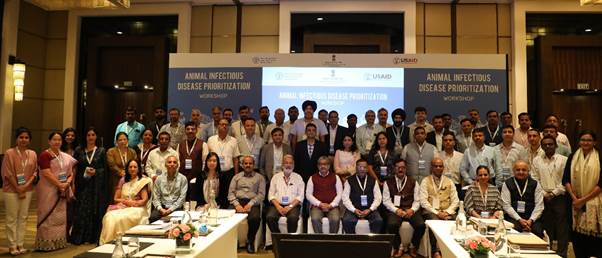New Delhi: A pivotal three-day workshop on Animal Infectious Disease Prioritization commenced today in New Delhi, organized by the Food and Agriculture Organization of the United Nations (FAO) in collaboration with the Department of Animal Husbandry & Dairying (DAHD), Ministry of Fisheries Animal Husbandry and Dairying, Government of India.
The workshop, inaugurated by Dr. Abhijit Mitra, Animal Husbandry Commissioner (AHC) at DAHD, aims to enhance the process of prioritizing infectious diseases that impact animals. Dr. Mitra highlighted the critical importance of considering economic losses in disease prioritization. He emphasized that the financial repercussions of infectious diseases—ranging from reduced productivity to the costs of treatment and control—have profound implications not only for the agricultural sector but also for the broader national economy.
In his address, Dr. Mitra also advocated for incorporating biodiversity loss as a significant criterion in the disease prioritization process. He pointed out that the spread of diseases among wildlife and other species leads to biodiversity loss, which has long-term effects on ecosystems and their services. By including biodiversity impacts, the prioritization process can adopt a more comprehensive approach, recognizing the interconnectedness of animal health, environmental sustainability, and human well-being.
Dr. Raj Kumar Singh, Epidemiology, AMR, and Zoonoses Specialist at FAO India, provided a detailed overview of the Animal Infectious Disease Prioritization process and the role of various committees involved. His presentation outlined the steps taken to map, identify, and prioritize animal infectious diseases based on their economic and health impacts.
The workshop brought together a diverse group of experts, including representatives from DAHD, the Indian Council of Agricultural Research (ICAR), State Veterinary Universities, State Animal Husbandry Departments, USAID, Jhpiego, and the ECTAD Team of FAO India.
Key Objectives and Agenda
The primary goal of the workshop is to map, identify, and prioritize key animal infectious diseases through a comprehensive process. The workshop’s agenda includes:
- Mapping: Identifying significant animal infectious diseases through expert consultations and secondary research, assessing their economic and health impacts.
- Identification: Evaluating diseases based on prevalence, economic impact, and implications for both animals and humans.
- Prioritization: Ranking and prioritizing diseases that pose the greatest threat to terrestrial animals such as livestock, poultry, and wildlife, as well as zoonotic diseases that could affect human health.
The next two days will involve in-depth discussions and evaluations to rank diseases according to their significance. The workshop aims to bolster surveillance efforts and inform the development of more effective disease control programs. By prioritizing diseases with the highest impact on the economy and biodiversity, the workshop seeks to create strategies and allocate resources more effectively, fostering a more sustainable and resilient animal health system in India.
This workshop marks a significant step toward strengthening India’s approach to managing animal infectious diseases, integrating economic, ecological, and public health considerations into the disease prioritization process.





